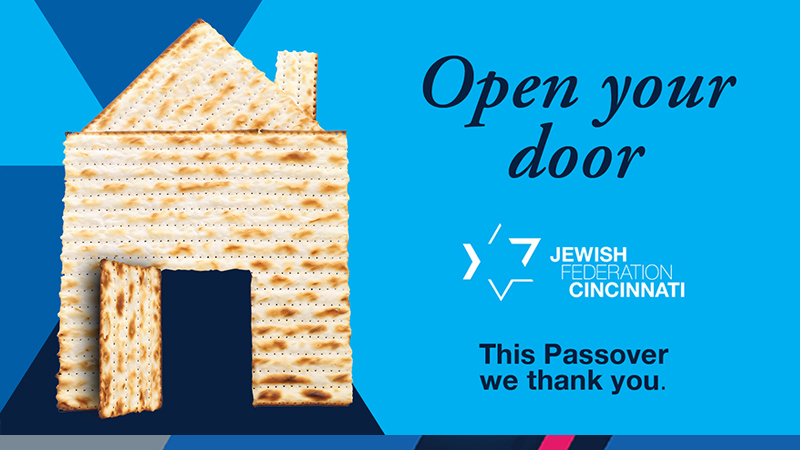Danielle V. Minson — Raising the Bar

Why Passover Stirs Us to Help Ukraine
As Jews, we see ourselves in the struggle and story of the refugee. Our Haggadah speaks of “every generation” undergoing hardships; fleeing what we thought were our home nations, societies, and governments, often driven out by the threat of antisemitism—in search of safer, freer lives.
Today, with the Ukraine crisis looming, we draw not only on the refugee story so central to our Jewishness, but also the essential Jewish value of tikkun olam, or repairing the world. Our tradition, our values, and our identity call us to do all we can to help. And we are—you are—helping.
Over 200,000 Jews live in Ukraine. The Jewish Federation of Cincinnati, as part of the international Federation system, is trying to support not only them, but all Ukrainians in need. Our partner agencies, which we have supported for years, the Jewish Agency for Israel (JAFI) and the American Jewish Joint Distribution Committee (JDC), have boots on the ground, in and around Ukraine.
JAFI is operating 18 facilities at five different border crossings, and coordinated almost 300 buses with local organizations. “Most arrive with just the clothes on their backs,” reports JAFI.
JDC has delivered lifesaving emergency assistance to tens of thousands of Jews under attack. With your help, they have provided more than 18,700 refugees with vital necessities like food and medicine. JDC has assisted in the evacuation of over 10,000 people from Ukraine since the beginning of the war. On average, JDC has some 2,000 beds occupied each night, in total, in Moldova, Romania, Hungary and Poland.
The Israeli field hospital in Mostyska, Ukraine, “Kohav Meir” (named after Ukrainian- born former Israeli Prime Minister Golda Meir, meaning “Shining Star”) has now been operating since mid-March. The hospital, financed in part by Federation-supported JDC, is Israel’s flagship humanitarian effort. Its 60 original Israeli medical personnel have just been replaced by 80 new staff members. It has treated more than 2,300 patients so far, of whom 300 were children.
Thanks to you, the Jewish Federation has raised over $500,000 to date as part of our national umbrella organization’s commitment to raise $42 million for Ukraine relief. This goal has already been achieved.
Our local Russian-speaking community has been drawn full-force into this crisis. Nearly one in ten Jewish households here have at least one Russian-speaking member. The 220 members of Jewish Family Service’s Russian Jewish Cultural Center currently have video calls four days a week, and meet in-person on Tuesdays. Immigrants themselves, they are typically over 80 years old and, while they may speak three languages fluently, speak limited English. “They rely on us, now more than ever. We check on them and, respectfully, ask them how they are doing. Sometimes, instead of being cheerful as was typical, they have tears in their eyes,” said Luda Gikhman, Director of the Center.
“Everyone is stressed,” Gikhman continued. “People feel this is a shame in the 21st century that people are killing each other.” One family has been calling loved ones in Ukraine every day, unable to get through. Others have been sending money to help their family members get out. Every day there is new anxiety, new information, new fears.
That is why our traditions help. On Friday, when we gather around our seder tables to reenact our ancestors’ exodus from Egypt, we will remember the ancient wisdom in our traditions, wisdom that is instructive today: we are all responsible for opening our doors to invite the stranger. We are all responsible for one another on the journey towards safety and freedom.
Passover is the single most celebrated Jewish holiday. On behalf of the staff and lay leadership at the Federation, I wish you a meaningful Passover seder, with the singing of “Dayenu,” with children and/or grandchildren to find the afikomen, and with the people you cherish.
Thanks for caring about our community and what we do.
Stay connected: sign up for our newsletter here.

